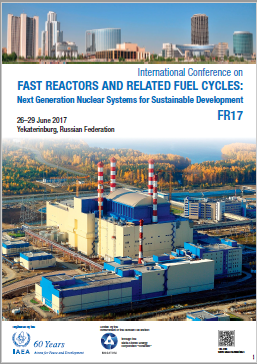Speaker
Andrei Shadrin
(Bochvar Institute)
Description
Mixed U-Pu used fuel of fast reactors has a high Pu content, high burn-up (50 GW/days*ton and more), and short cooling time (no more than 3 years) as compared with the thermal reactors used fuel. Combined (pyro + hydro) and hydrometalurgy reprocessing technologies are developed in Russian Federation for the close nuclear fuel cycle. These technologies provide reprocessing of used fuel with 1-3 years cooling time, 10-15 % of Pu content and burn-up up to 100 GW/days*ton.
The aim of reprocessing is production of purified mixture of actinides oxides. The purification of actinides from fission products should be around 10.000.000.
The dry reprocessing technology based on pyroelectrochemical refining is under development as well. This technology should be suitable for reprocessing of fast reactors used fuel with burn-up more than 100 GW/days*ton and 1 year cooling time
The main results of the studies are being discussed in a current paper.
Within studying the analysis of products and operations of reprocessing 8 MOX irradiated assemblers from BN-600 reactor at RT1 plant with burn-up from 73 up to 89 GW/days*ton were performed. The technology steps were made under standard conditions. The increasing of Pu loses during MOX used fuel of BN-600 as compared with thermal reactor used fuel reprocessing was not found.
The design of reprocessing facility for mixed U-Pu nitride fuel started at 2015. This facility is planed to be built at Siberian Chemical Combine as a part of experimental and demonstrating energocomplex with reactor BREST–ED-300.
Country/Int. Organization
Russian Federation
Primary author
Andrei Shadrin
(Bochvar Institute)
Co-authors
Dr
Konstantin Dvoeglazov
(ITCP "PRORYV")
Dr
Vladimir Kashceev
(ITCP "PRORYV")
Dr
Yurii Mochalov
(ITCP "PRORYV")

